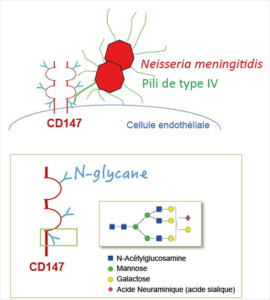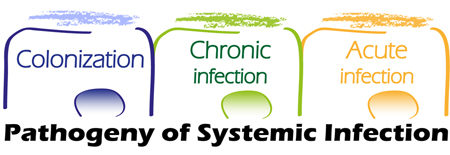Receptor Recognition by Meningococcal Type IV Pili Relies on a Specific Complex N-glycan. Leguennec et al Proc Natl Acad Sci U S A, 117 (5), 2606-2612 2020 Feb 4
News linked to Mathieu Coureuil & Xavier Nassif

Bacterial infections are frequently based on the binding of lectin-like adhesins to specific glycan determinants exposed on host cell receptors. These interactions confer species-specific recognition and tropism for particular host tissues and represent attractive antibacterial targets. However, the wide structural diversity of carbohydrates hampers the characterization of specific glycan determinants. Here, we characterized the receptor recognition of type IV pili (Tfp), a key adhesive factor present in numerous bacterial pathogens, using Neisseria meningitidis as a model organism. We found that meningococcal Tfp specifically recognize a triantennary sialylated poly-N-acetyllactosamine-containing N-glycan exposed on the human receptor CD147/Basigin, while fucosylated derivatives of this N-glycan impaired bacterial adhesion. Corroborating the inhibitory role of fucosylation on receptor recognition, adhesion of the meningococcus on nonhuman cells expressing human CD147 required prior defucosylation. These findings reveal the molecular basis of the selective receptor recognition by meningococcal Tfp and thereby, identify a potential antibacterial target.
